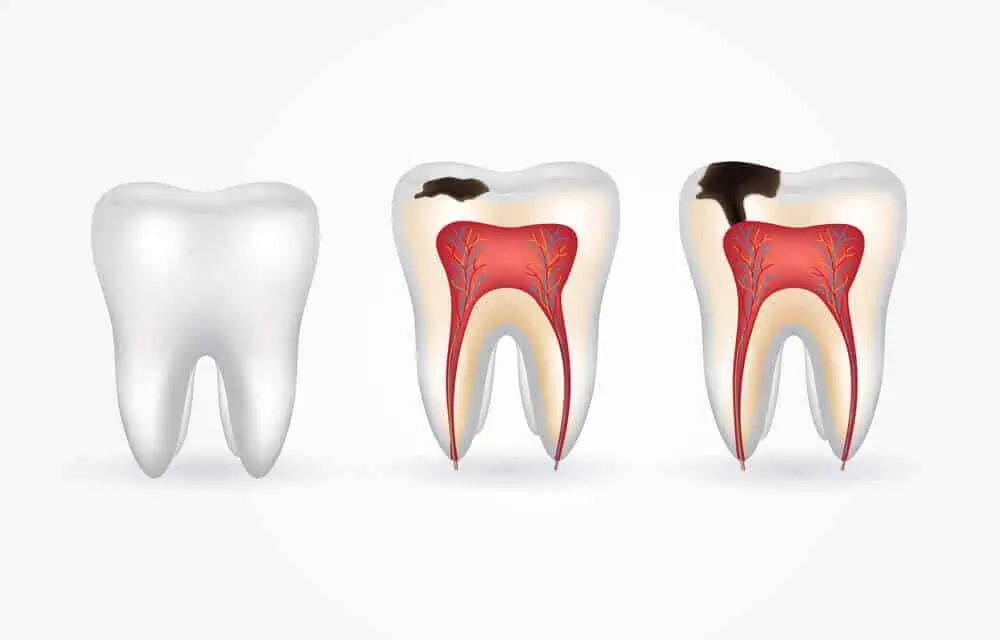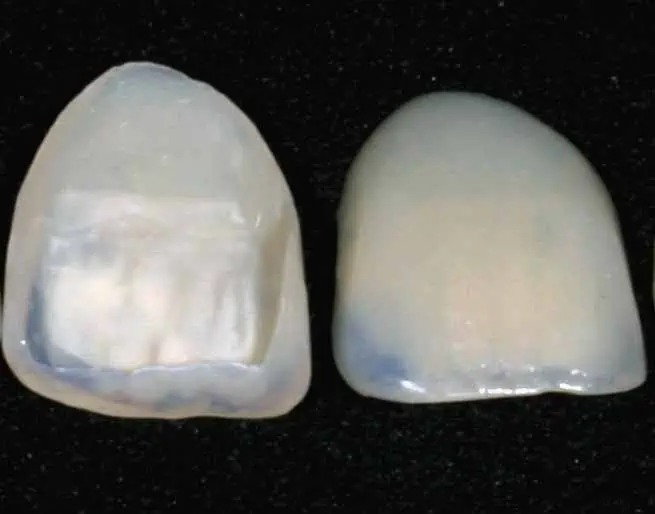Bulimia teeth are the result of an eating disorder that comes in the form of frequent self-induced vomiting known as bulimia nervosa. Bulimia is not only harmful to your body but also to your dental health. From harmful weight loss to rapid tooth decay, this eating disorder can hurt your health as much as most other diseases. In this article, we will explore the cosmetic and health impacts of the consistent binging and purging known as bulimia nervosa.
Bulimia nervosa
Bulimia nervosa is a serious, and potentially life-threatening, eating disorder. Many people with bulimia will secretly binge eat large quantities of food, with a loss of control over the amount they are eating, and then later purge in an attempt to rid their system of the extra calories.
Bulimia side effects and complications
People suffering from bulimia experience many side effects and complications. While the end goal of a bulimic individual is to lose excess weight and have a more “desirable” outward appearance, the effect of repeatedly purging your body can have an opposite effect. A few of the complications associated with bulimia are:
- Poor self-esteem, strained relationships, and poor social interaction.
- Dehydration, which can lead to kidney failure.
- Irregular heartbeat or heart failure.
- Severe tooth decay and gum disease.
- Absent or irregular periods.
- Digestive problems.
- Bulimia mouth sores.
Signs of bulimia
There are several warning signs that someone may be struggling with an eating disorder. It is important to seek help from a medical professional if you or someone you know is experiencing any of these symptoms:


- Obsessive preoccupation with weight or size.
- Fear of weight gain.
- Repeatedly consuming large amounts of food in one sitting.
- A feeling of loss of control while bingeing inability to control portions.
- Purging after episodes of bingeing either through excessive exercise or vomiting.
- Using laxatives, diuretics, or enemas when they are not needed.
- Restricting calories and fasting in between bingeing episodes.
- Excessively using dietary supplements for weight loss.
Tooth damage from bulimia
Disorders like anorexia and bulimia can lead to tooth decay due to stomach acid repeatedly washing over the teeth and wearing down the enamel that protects the teeth from damage. Weak teeth enamel can lead to cavities and tooth decay. The repeated exposure to stomach acids will usually cause erosion of the backside of the anterior maxillary teeth. For this reason, dentists are usually the first to notice a patient has bulimia since most affected are at an average weight.


An eating disorder can also interfere with saliva production which can lead to problems with dry mouth. Lack of saliva production can speed up tooth decay, because saliva aids in keeping the mouth clean. Without saliva to wash away food particles, limit bacteria, and aid digestion, teeth enamel are subject to rapid degradation.
Signs of bulimia teeth
As mentioned before, a dentist will often be the first to notice a patient is suffering from bulimia. It usually takes about three years of erosion for damage to become apparent. Some oral health indicators that someone is suffering from this disorder are:
- Dry mouth resulting from the lack of saliva production.
- Teeth enamel erosion, causing a translucent appearance to teeth.
- Susceptibility to cavities.
- Painful or bleeding gums due to gum disease.
- Soft palate damage from stomach acid.
- Broken, cracked, or missing teeth due to tooth decay from the wearing down of tooth enamel.
- Reversal of previous dental work as a result of tooth decay.
If you suffer from an eating disorder, first of all, we urge you to seek help. Secondly, there are steps you can take to reduce the impact it will have on your teeth. It is extremely important to maintain oral health with meticulous toothbrushing and flossing. After self-induced vomiting, do NOT brush your teeth, but rather rinse with a solution of water and baking soda to neutralize the stomach acid and prevent the degradation of tooth enamel. And as always, see your dentist regularly and consult with them about your specific needs.
Bulimic teeth repair
If you have lost your teeth due to decay or if your teeth are severely discolored or misshapen due to constant contact with stomach acid there are several ways to repair them. Over time teeth degrade no matter what you do in your life so, these effects are not limited to those suffering from bulimia. The field of restorative dentistry offers a variety of options to fix the damage:


A veneer is a plastic or porcelain coating over the tooth. Usually, these are used to change the color and shape of a damaged tooth. This may be a good option if the decay of the tooth is mostly superficial and only affects the aesthetic of the tooth rather than the health.
Implants can be used to replace an entire tooth or several in a row. Sometimes complications from bulimia can lead to loss of dentition and implants are the best way to replace those that are missing. By drilling a hole into the jawbone and setting in a titanium mount for a cap, the tooth can be fully replaced, permanently.
A filling can be used to fill in a cavity that has formed in the tooth from exposure to stomach acid and bacteria. This is only possible if only one part of the tooth has enough damage to be replaced, but not the entire tooth.
Sometimes the entire outside of the tooth is too damaged to keep but can be shaved down to create a natural tooth post to support a dental crown (cap). This option is great if the root of the tooth is intact but the tooth itself needs to be replaced.
The cost of each restorative option varies greatly. See the table below for a comparison:
Treatment | Cost per tooth |
Veneers | $250-$2500 |
Implants | $2500+ |
Fillings | $50-$4500 |
Cap/Crown | $500-$2000 |
National Eating Disorder Association helpline
Bulimia is a medical condition that requires the care of a medical professional. If you or someone you know is struggling with any disorder, then call the National Eating Disorder Association (NEDA) helpline:
Toll-Free Phone Number: 1-800-931-2237 (9am to 9pm EST).
For 24/7 crisis support, text ‘NEDA’ to 741741.
Conclusion
Bulimia nervosa is an eating disorder that doesn’t just negatively impact your general health but also can have severe consequences on your oral health. If you have this disorder, the first step you should take is to find treatment, but while you’re doing so, it’s also important to make sure to take extra good care of your teeth. That’s because tooth decay can lead to loss of teeth and gum disease which left untreated can have serious negative impacts on overall health.
FAQ
How can you treat teeth damaged by bulimia?
Treatment of teeth damaged by repeated exposure to stomach acid from vomiting varies. In severe cases, you might need full replacement like implants and in less severe cases cosmetic fixes may do.
Can a dentist tell if you have bulimia?
Yes. Your dentist will often be the first person to recognize if you are suffering from an eating disorder due to the decay on the inner part of the tooth, as well as thinner enamel.
How long does it take for an eating disorder to ruin your teeth?
Every case is different, and it also depends on the frequency of your purges. However, in general it can take about three years of erosion for damage to become apparent.
Can you lose your teeth from bulimia?
Yes. One of the many terrible effects of bulimia is that the thinning of your enamel and resulting tooth decay can become so severe that the entire tooth may be lost.
Mayo Clinic: Bulimia nervosa. Consulted 16, June 2020.
Mayo Clinic: Cavities/tooth decay. Consulted 16, June 2020.
American Dental Association: Eating disorders. Consulted 16, June 2020.




